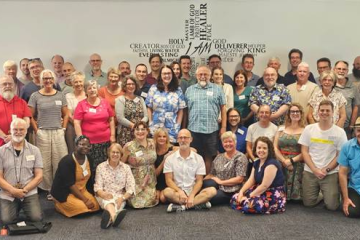Choose Peacemaking – John 11:17-44
In chapter 15 of Field Notes for the Wilderness, Sarah Bessey poses the question, “Are we peacemakers or peacekeepers?”
Peacekeepers try to keep the peace, quieten things down, smooth things over, keep things as they are. “Peacekeeping,” Bessey writes, “is…a status quo maintainer and sometimes even cooperation with oppression.” Peacemaking, on the other hand, is being prepared to confront issues, seeking to resolve those issues and actively embodying shalom.
“I’ve often been,” Bessey confesses, “more of a peacekeeper than a peacemaker…. Some of this is my own stuff to deal with, of course, but some of it is the cultural conditioning of femininity, especially in religion, the high value placed on being “a nice girl” and “easy to get along with”…. Every hard conversation or confronting I have is fraught with self-doubt and panicky second-guessing, badly executed attempts and sleepless nights.” The only thing I’d add to that is the self-recrimination afterwards, that indoctrinated guilty feeling, that I have done something wrong by not “putting up and shutting up” like a good Christian woman should!
I am, however, sorrier about times I have been a peacekeeper and not a peacemaker.
I have a strong memory, from my teens, when my parents were with Baptist Mission Australia in Papua, Western New Guinea, of driving back from Sentani, after the Sunday evening service, to Kotaraja where we lived. (Kotaraja means Kingstown as does Kingston so I realised this week I’ve come full circle!) Just before Abepura, however, we were stopped at an army checkpoint. Machine guns were pointed into the back of the van, and the indigenous Dani men who worked with my father, were told they had broken curfew and were under arrest, but that we should drive on… I can remember being terrified, telling them they just get out and go with the soldiers. I can remember them being terrified too. But dad got out of the front of the car and said, if they were under arrest, he would come with them. And then we waited, my mother and brother and sister, for what felt like hours, until they all emerged from the army base, Dad telling mum the Danis had been spared a roughing up in the holding cells overnight.
Peacemaking, as I said, is being prepared to confront issues, seeking to resolve these issues and actively embodying shalom. Peacemaking, Isaiah 58:6 says, is “[loosing] the chains of injustice… [setting] the oppressed free, and [breaking] every yoke…”
In this chapter Bessey also retells the story of Mary and Martha and Lazarus that we read this morning. Three siblings who appeared in last week’s reading as well, John 12; Martha serving at a dinner – the word for serving is the same word as ‘deacon’, Lazarus sitting with Jesus as a disciple, and Mary, washing Jesus’ feet, a chapter before Jesus does the same, fulfilling “Jesus’ love commandment before he even teaches it.”
Chapter 11 of John, however, begins in a place of great distress. Lazarus is ill, gravely ill, and his sisters send a message to Jesus, “Lord, he whom you love [can you hear the grief and desperation in these words?] is ill.”
But rather than rushing to Lazarus’ aid, Jesus delays.
Pragmatic reasons are given in the text. The religious leaders in Judea were trying to kill him. I love how the NRSV puts this, (verse 8) the disciples saying, “[Ahh..] Rabbi, the Jews were just now trying to stone you, and you are going there again?” And there are theological reasons – that this delay will give rise to greater belief among his disciples.
But Lazarus dies, and Martha’s first words to Jesus, and Mary’s first words to Jesus are, “Lord, if you had been here, my brother would not have died.” And despite Jesus’ very real grief at the death of his friend – the famous verse, ‘Jesus wept!” – the question from others (verse 37) is also, “Could not he who opened the eyes of the blind man have kept this man from dying?”
The reasons Jesus delays are significant, and what the story unfolds about the power of God at work in our world is significant, but I think, in part, these questions are left unresolved – because this is how our questions about death, about pain, about prayers that go answered often are….
But we know, in Jesus, we have a God who grieves with us. Translators struggle to translate the words used for Jesus’ grief here. And we know we have a God who hears and who cares for us. And we know, through this story, this mini-story about the great story of resurrection, that our God is resurrection and life and invites us to be part of this work of resurrection and life.
We see this in the lives of Martha and Mary. According to custom, women in mourning did not leave the house, but both of them go out to see Jesus. Then custom dictated that “women mourners [lead the funeral procession], for it was held that it was woman who by her first sin brought death into the world”, but these two women lead their community – not by embodying sin – but by embodying an extraordinary faith in the new way of life in God.
“Even now,” Martha says to Jesus, “I know that God will give you whatever you ask of him… [and] I know that [my brother] will rise again in the resurrection on the last day.” “I am the resurrection and the life [resurrection and life now!],” Jesus says, “Do you believe this?” “Yes, Lord,” she says, “I believe that you are the Messiah, the Son of God, the one coming into the world.”
This story foreshadows those women whose faith, whose embodied shalom, takes them to the empty tomb. This story foreshadows those women, whose faith, whose embodied shalom, makes them the first evangelists. Women – no longer portents of sin, but proclaimers of God’s resurrection and life!
And this is what unfolds in verses 38 to 44. Jesus goes to the tomb saying, “Take away the stone.” And Martha, as Bessey says, “ever practical and ever-unafraid of telling the truth, even to the Messiah, says if they remove the stone, the stench of the rotting body will be horrible.” And Jesus says to her, “Did I not tell you that if you believed, you would see the glory of God”
So, they do as Jesus says, and in a loud voice, Jesus cries out, “Lazarus, come out!” And Lazarus comes out.
But then, Bessey writes, “comes an often unremarked and yet remarkable statement from Jesus. He tells Mary and Martha and the crowd, [“Unbind him, and let him go.”] Lazarus has been raised from the dead, but he is still bound by the clothes of the dead. He’s still encased in the remnants of death. It will take the hands of his sisters and his friends to unbind him, to set him loose to life again. With those words, Jesus invites the community – us – into the work of resurrection.”
The work of resurrection – the unbinding, the loosing, the setting free work of resurrection – the work of active and embodied peacemaking –this is our work now.
“This is the difference between peacemaking and peacekeeping,” Bessey says, “Peacekeeping says, “It will stink if you open the door, let the dead stay dead.” Peacemaking not only says, “Remove the stone!” and “Lazarus, come out!” but also says, “Unbind him from the clothing of the dead,” and then gets to work.”
And that is what we are doing today. Getting to work. Getting out of our cars or our houses, our normal Sunday routines, to stand with people who are do not have permanent visas, who are in detention or living in limbo in Indonesia. We are doing the work of active and embodied peacemaking.
This is what we have been doing for many years raising up women’s voices in this church. Historian Rebecca Hilton will tell me it goes back further, but I’m looking at 1992 when one of our deacons, Bill Hughes, said we needed more women leaders, more deacons like Martha, and although being a woman in leadership is not easy (oh, girl, its not easy) we are doing the unbinding work of resurrection.
And this is what this church has been doing, since 1997, when it agreed to make a formal apology to the Aboriginal community – a Sorry Day eleven years before the National Apology to Indigenous People. You can read those words just inside the door of our hall. This is the work our First Nations Action Plan group are continuing – the work of active and embodied peacemaking.
And this is what we have been doing for the past seven years with our Association – confronting an issue that is not right and seeking to resolve it. The adoption of a statement without any biblical or theological work! The adoption of a statement that does terrible pastoral harm! The adoption of a statement that disregards our Baptist values of interpreting Scripture as it points to Jesus, freedom of conscience and the autonomy of the local church!
We have said we simply believe the Good News of Jesus is for all people without qualification. That all are welcome in this place. That we refuse to create a two-tiered church system on which gay or lesbian or divorced or de-facto Christians sit at a lower tier than the rest of us. We have told them, in the beautiful words of Megan Williams, that we want this to be a place where people can bring their whole selves. Where people are no longer portents of sin, but proclaimers of God’s resurrection and life!
Amen? Amen! May it be so! On this Psalm Sunday as we remember the one who did not keep the peace, but who made peace for us, let us commit to being peacemakers alongside Jesus, to being part of this work of unbinding, to proclaiming – to our world – God’s resurrection and life.


